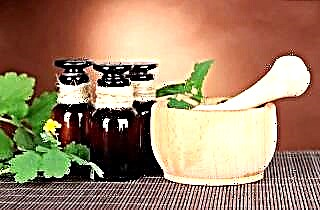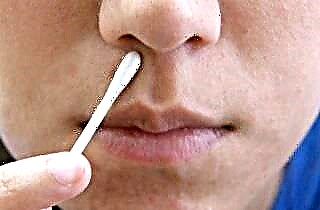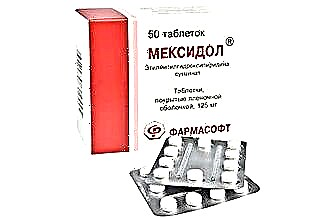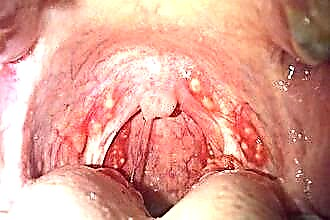All sorts of damage to the mucous membrane, or, more simply, sores in the nose at least once happened to almost everyone. Sometimes they pop up unexpectedly and after a while disappear by themselves. More often, the nasal mucosa is covered with sores during a severe cold - allergic or concomitant respiratory diseases. It also happens that there seems to be no illness, the state of health is excellent, and the sore nose does not go away for a long time. Why does this happen and how to deal with it?
Where do the sores come from?
 In a healthy person, the nasal mucous membranes are constantly moisturized. Mucus partially protects us from the penetration of pathogens through the respiratory tract, sharpens the sense of smell, traps particles of dust and dirt, preventing them from entering the throat and bronchi. But the mucous membranes themselves are very delicate, they are easily irritated and dry out under the influence of external and / or internal factors.
In a healthy person, the nasal mucous membranes are constantly moisturized. Mucus partially protects us from the penetration of pathogens through the respiratory tract, sharpens the sense of smell, traps particles of dust and dirt, preventing them from entering the throat and bronchi. But the mucous membranes themselves are very delicate, they are easily irritated and dry out under the influence of external and / or internal factors.
Sometimes even too dry air in the room is enough for dense crusts to form in the nose, which interfere with normal breathing. If they are abruptly torn off, then the mucous membrane can be damaged and a wound will appear in the place of the crust. An infection that has got into it provokes an inflammatory process. If the immunity is weak and the wound is not treated, then a sore will soon form, which can rot for a long time and deepen, affecting an ever larger area.
But this is only the simplest example of how long-lasting sores can turn out. Often the process is much more complicated, and internal and external factors interact, influencing each other.
For example, smoking simultaneously sharply lowers the protective functions of the body and causes permanent irritation of the nasal mucosa. Agree, just perfect conditions for sores!
With a persistent runny nose, not only the surface of the skin is irritated, but also the hair follicles, from which the villi lining the mucous membrane grow. In their place, pustules appear, and sycosis gradually develops. Under the influence of chemicals, toxins, including cigarette smoke, which corrodes delicate mucous membranes, non-healing ulcers can form.
Very often, the cause of the appearance of sores on the nose, inside it and on the upper lip is the herpes virus, which, once entering the body, is already constantly present in it. Strong immunity does not allow him to go into the active stage. When the protective functions of the body weaken (for example, with a cold or flu), the virus immediately attacks the skin and the easiest way is to damage the delicate mucous membranes. Therefore, herpes is sometimes called "the common cold" - it is a frequent companion of respiratory diseases.
What to do at home
 If the sore that has appeared in the nose does not yet cause much concern, is not too painful and does not form new foci, you can try to cope with it using folk methods. Their effectiveness depends on how correctly you were able to determine the nature of the sore.
If the sore that has appeared in the nose does not yet cause much concern, is not too painful and does not form new foci, you can try to cope with it using folk methods. Their effectiveness depends on how correctly you were able to determine the nature of the sore.
It can be caused by viruses, bacteria, fungi or negative external factors. And different means will help in each case - a universal drug, even a pharmacy one, simply does not exist.
- Rinsing with antiseptic solutions. Prevents further spread of sores along the nasal mucosa. It is best to do it several times a day before any other procedure. For washing, you can prepare a rich decoction of oak bark, celandine, St. John's wort, elecampane, calendula, eucalyptus, pine branches. To do this, pour 2 tablespoons of dried crushed plants with 0.5 liters of boiling water, boil for 10-15 minutes over low heat, and then insist in a thermos for at least an hour. Strain well so that plant particles do not enter the respiratory tract.
- Onion with honey. A powerful antibacterial and anti-inflammatory agent that heals well wounds, sores, cracks, while disinfecting the nasal passages and sinuses. Helps get rid of the common cold. But when instilled, a rather strong burning sensation is felt, so the procedure is not very pleasant. White onions (they have the largest amount of phytoncides!) Must be carefully chopped and mixed with the same amount of honey. After 15-20 minutes, drain the resulting juice and drip 3-4 drops into each nostril 2-3 times a day. The remedy is also effective for chronic rhinitis, sinusitis, sinusitis.
- Moxibustion with essential oils. Copes with wavki, wounds and ulcers of an infectious, viral and fungal nature. Destructive for most pathogenic microorganisms. It is necessary to choose natural high-quality essential oils with strong antibacterial and antiseptic properties: juniper, cedar, celandine, thuja, eucalyptus, rose, tea tree. Apply exactly to the sores with a cotton swab, no more than 2-3 times a day. You cannot drip your nose with undiluted essential oils - there will be a serious burn of the mucous membrane.
- Garlic oil. It is also an excellent antiseptic that acts mildly, does not irritate or dry out mucous membranes. It can be used to treat all kinds of sores and chronic rhinitis. Peel two large heads of garlic, chop each clove well. Pour a glass of olive oil (you can use a good sunflower oil). Insist in a cool dark place for 2 to 14 days. Lubricate the nose with a cotton swab dipped in oil, you can strain and instill 3-5 drops 3-4 times a day.
 Alcohol solution of celandine. In its pure form, it can be used for cauterization of sores. Diluted in half with water - for rinsing the nose. Added to hot water - for steam inhalation. A universal and very effective remedy for sores in the nose, provoked by any microorganisms. Accelerates the healing of eczema, herpes, heals purulent ulcers.
Alcohol solution of celandine. In its pure form, it can be used for cauterization of sores. Diluted in half with water - for rinsing the nose. Added to hot water - for steam inhalation. A universal and very effective remedy for sores in the nose, provoked by any microorganisms. Accelerates the healing of eczema, herpes, heals purulent ulcers.
These are just the most effective and simple folk remedies. More recipes can be found online. But do not mindlessly follow all the advice and smear sores with earwax, sculpt egg film on them and do other nonsense, as a result of which irritation may increase or a new infection may get.
If you have any doubts about any of the methods, consult your doctor or refuse him altogether.
Pharmacy preparations
Ready-made pharmaceutical preparations help to cope with sores in the nose even faster. Among them there are universal ones, and there are targeted actions that effectively eliminate certain types of pathogenic microorganisms. Before using such funds, it is better to take a smear on the microflora in order to know exactly the pathogen that caused the sore to form.
- Propolis tincture. A universal drug, which was previously considered a folk remedy, but now it can be bought at any pharmacy, since it is in one of the first places in terms of anti-inflammatory and antiseptic properties. Use for cauterization of wounds, steam inhalation and compresses. A compress made from propolis tincture helps to get rid of boils faster, improves blood circulation, makes breathing easier and has a good healing effect in chronic rhinitis. A small amount of tincture is applied to a cotton pad and fixed to the nose with a plaster.
- Sulfuric ointment. Well heals fungus, herpes sores, helps to quickly get rid of wet crusts, drying them and promoting early exfoliation. Unlike earwax, sulfuric ointment is sterile, does not contain microbes, epithelial cells and particles of dust and dirt. Apply the ointment with a cotton swab, which must then be thrown away (do not use several times!).
- Zinc ointment.Has an excellent drying effect. A great way to heal wounds, ulcers, abscesses. Do not apply over a large area, so as not to provoke drying and cracking of the mucous membrane. Not effective for dry crusts, has no antibacterial effect.
 "Clotrimazole". Strong, but at the same time absolutely safe for mucous membranes antifungal ointment. Helps to get rid of sores, the appearance of which is provoked by Candida and other types of molds. Including black mold spores, which are often carried by air conditioners.
"Clotrimazole". Strong, but at the same time absolutely safe for mucous membranes antifungal ointment. Helps to get rid of sores, the appearance of which is provoked by Candida and other types of molds. Including black mold spores, which are often carried by air conditioners.- "Gerpevir" and its analogues. Drugs that suppress the activity of the herpes virus. They are not able to kill the virus completely, but they can quickly eliminate its external manifestations. The best effect is obtained by the simultaneous internal and external use of drugs, which are available in the form of tablets and ointments or creams.
- "Levomekol". It has anti-inflammatory, antibacterial and antiseptic properties, softens the crusts, accelerates the healing of mucous membranes. It is used when sores are caused by pathogenic bacteria. This is an antibiotic ointment, so before using it for the first time, it is advisable to test for an allergic reaction, although it is quite rare.
If the sores are provoked by external stimuli, then balms on a vaseline or oil base "Rescuer", "Doctor Mom" and others help to get rid of them. A spray or ointment with panthenol will help to speed up the process of restoring the mucous membrane.
Prevention measures
Sores in the nose can go away several times faster if additional preventive measures are followed during treatment:
 quit smoking completely;
quit smoking completely;- take all possible measures to quickly treat a cold;
- ventilate the room at least 2 times a day;
- do wet cleaning regularly;
- remove all chemical irritants: household chemicals, perfumes, etc.;
- humidify the air, especially in winter;
- make preventive cleaning of the air conditioner;
- check if there is mold in the apartment and, if found, eliminate it;
- remove all allergens or take antihistamines;
- take immunomodulators;
- eat fresh fruits and vegetables or drink natural juices;
- do not pick out crusts, do not open boils and do not squeeze out pus;
- do not pick your nose with your fingers, apply ointments only with disposable sticks.
During periods of outbreaks of respiratory diseases, avoid crowded places, and if you really have to be there, protect the respiratory organs with a gauze bandage. When working in hazardous industries, use personal protective equipment.
If you cannot get rid of sores in the nose on your own within 1-2 months, be sure to consult your doctor. Prolonged irritation and damage to the mucous membrane can lead to its degeneration, the formation of polyps, a decrease or complete loss of smell, and even malignant neoplasms.

 Alcohol solution of celandine. In its pure form, it can be used for cauterization of sores. Diluted in half with water - for rinsing the nose. Added to hot water - for steam inhalation. A universal and very effective remedy for sores in the nose, provoked by any microorganisms. Accelerates the healing of eczema, herpes, heals purulent ulcers.
Alcohol solution of celandine. In its pure form, it can be used for cauterization of sores. Diluted in half with water - for rinsing the nose. Added to hot water - for steam inhalation. A universal and very effective remedy for sores in the nose, provoked by any microorganisms. Accelerates the healing of eczema, herpes, heals purulent ulcers. "Clotrimazole". Strong, but at the same time absolutely safe for mucous membranes antifungal ointment. Helps to get rid of sores, the appearance of which is provoked by Candida and other types of molds. Including black mold spores, which are often carried by air conditioners.
"Clotrimazole". Strong, but at the same time absolutely safe for mucous membranes antifungal ointment. Helps to get rid of sores, the appearance of which is provoked by Candida and other types of molds. Including black mold spores, which are often carried by air conditioners. quit smoking completely;
quit smoking completely;

